- Home
- Lin Carter
The Man Who Loved Mars Page 2
The Man Who Loved Mars Read online
Page 2
He went over backward, legs tangling with the wrought-iron chair in a terrible clatter and flurry of kicking feet, landing full on his shoulders. I stood there and watched him groggily spew the contents of his stomach all over that handsome suit of gray kyrolan and felt a vast inner contentment such as I had not known for many, many months. We ex-monarchs, though deposed, have our pride. We rarely get a chance to show it so pleasantly.
I made a small bow to the Doctor and the girl, both of whom were frozen with the suddenness of the thing.
“Thank you for a delightful conversation,” I said lightly. “A pity it has to terminate in such a very physical way. However, I am not in the least interested in investing in any treasure maps to the Lost City, thank you. They are half a dozen to the dollar in any of the better bazaars anywhere in Sun Lake City. I am not interested. Good evening!”
And I turned grandly on my heel to make my way through the tables. But the Doc was quicker on the uptake than I would have thought. He uttered eight words in a quiet voice that stopped me dead in my tracks.
“Not interested in a free ticket to Mars?”
I stood there and felt the ache rise up within me, who could never legally go off-planet for the rest of my days.… It had been the price of my freedom, so-called: permanent, life-long revocation of my off-planet visa. I was glad my back was turned so they could not see the expression on my face.
And then the old man clinched it, and I was lost.
“It’s not a treasure map, Cn. Tengren,” he said softly, very softly. “It was a thought record that I found there in the ruins near Thoth-Nepenthes.”
I think I forgot to breathe for a while. I know that suddenly my chest ached and blood was roaring in my ears. A thought record! They could not be faked. Nor forged. Nor imitated. Only the mysterious savants of the Ancients knew the strange art of indelible mind recordings—io—photha, they call them in the High Tongue. There have only been two of them discovered in all the three-quarters of a century that terrestrial man has been on Mars, and they are beyond price. If he had a genuine thought record…
“Start talking,” I said, as I turned around and took my seat again.
2. An Hour Before Earthrise
All my life I have taken the most obvious route to the things I wanted, and with unfailing accuracy this has led me into the most obvious pitfalls. Often I have wanted to make myself over, dreamed of being a subtle, devious man, full of shrewdness and cunning, but the gods did not mold me of such clay. Of course, I was an idealist, a young reckless fool, and of course, I dreamed the old humanitarian dreams of “love thy neighbor” and all the rest of it. When I went to Mars ten years before, a wise man could have predicted almost everything that was going to happen to me: but there I was, a dreamy boy, eyes filled with starry hopes, heart drunk on high ideals that had gone out of fashion generations before, a young sociotician, a student of the ancient indigenous civilization of that dim, far-off, age-old desert world. It was the most natural thing in the world that I should be shaken and disgusted by the callous inhumanity and naked greed and terracentric contempt with which the Colonial Administration treated a people whose dignity and graciousness and lonely pride were all they had left of a magnificent civilization that had already begun to die while our own ancestors still slunk or slithered through the steamy fens of the Paleozoic…
Of course, I could not resist the old man’s offer. The plan was simplicity itself, and as for the offer, it was irresistible. For—how many years was it now? Only two?—I had dreamed of nothing else. “A free ticket to Mars…” I would gladly have paid any price, were it possible for me to buy my way back to that dim red world that fate or chance or fortune had made my heart’s home. But that could never be. No liner would carry me, no ticket agent would accept my fare, no visa could be obtained; I was like one of the old sailors back in the distant days of sailing ships—marooned for the unforgivable crime, the ultimate sin against a society I had come to loathe. Mutiny.
The only difference was that in my case they had chosen my desert island with exquisite cruelty: for I was an exile on the planet of my birth, my body’s homeland, my spirit’s prison. And now an old man’s avarice or lust for fame or whatever it was offered me a way out. A way home.
It all came out over coffee and cigars and a Lunarian liqueur I had never tasted before and whose name I have forgotten. The plaza before the old cathedral was a bit too public; I went back to their hotel, to the private suite Keresny had taken for the week. The suite was in one of the towers of The Grand Canal; this had been the newest of Venice’s innumerable hotels, a big, dull, Kremlin-style edifice the Russians had put up in the eighties during their transitory dream of world empire. It had been the administration center of all this part of Italy. After that particular dream crashed to ruin in the fire shower of the Twenty-Nine-Minute War, the Italians reclaimed it, knocked off the Ivan-the-Terrible gingerbread, dynamited the onion-shaped domes, and turned it into a first-class hotel. Today it was dingy, smelling of mildew and rat dung, slumping into decay.
Before we got down to the talking, the girl, Ilsa, drew the soundproof curtains while the greasy-faced Ukrainian, favoring me all the while with surly, glowering looks, unpacked a slim plastic case from the mound of luggage and set it going. I cocked a thumb at the gadget and raised an inquiring eyebrow.
“Is all well, Konstantin?” the Doctor asked, before answering my unspoken query. The surly Russian growled assent.
“Merely a slight precaution, Cn. Tengren. I believe the Americans, in their delightful slang, call it a debugging device. We have no particular reason to believe our rooms are under electronic surveillance; still, one can never be sure in these troubled times. And rumor has it that most hotels these days tape everything that happens on their premises as a matter of course. I believe some of the less scrupulous of them make a tidy sum giving information to the government spies and the political police.”
“It’s been a national custom for years,” I grinned. “Won’t they be suspicious, though, when this room registers a blank tape?”
He smiled that saintly smile again. “Not at all; almost everyone uses one of these devices. They are easily available on the Gray Market and most reasonably priced. Spies and criminals and revolutionaries—but also ordinary businessmen with an important contract to negotiate and everyday people cheating on their wives—use them. The instrument merely broadcasts a heterodyne wave that oscillates all over the radio frequencies, quite effectively scrambling the sound recordings. Since the wave is continuously overlapping, and the oscillations are purely random, it is technologically impossible to unscramble the tapes. But come! Let’s to business. My dear, coffee, I think, unless Cn. Tengren would prefer brandy…?”
“I’ve had enough for one night, I think.”
He offered me the best cigar I had tasted in six years; I leaned back in the big, comfortable pneumochair. It adjusted its shape to the contours of my body and began unobtrusively massaging the back of my neck and the muscles of my shoulders. I drank in the richly mellow smoke and let the old man talk in his smooth, gentlemanly diplomat voice, while the girl took the surly Ukrainian off somewhere to fix his face; he came back with his purpled jaw repaired with cosmetic gel above the beard and his vomit-messed suit exchanged for electric blue lounging pajamas. He looked a lot better, but from the smouldering glances he shot at me from time to time, I knew his temper had not improved. That sort of muscular lout protects his masculine self-image by throwing his weight around. I had hit him directly in the virility center of his ego—a far more sensitive spot than the pit of his stomach—and he would not soon forget that I had made him look ridiculous in the presence of the blond girl. I would have trouble with that one, I knew. But I hardly cared: if they could get me to Mars, they could break every bone in my body.
“Just a precaution,” the Doctor was saying in that beautiful, soothing voice. “I quite doubt if the politicals are still watching you after all this while; perhaps an occasional
spot check, nothing more. But it’s been two full years since, ah, since your legal troubles, and even the publicity must have died down long since. With the instrument on, we are safe from anything outside of an audio search beam, and you will observe I have seated our little group out of any possible direct beam, and the curtains should muffle our little conversation. Better to be on the safe side…”
The only question I asked, at the start, was the obvious one. If he had a thought record that told the way to the fabulous Treasure City, why did he need me? I told him, not quite with complete candor—but I’ll get back to that later—that I knew no more than most people about Lost Ilionis.
“Ah, but that is the simplest of all questions to answer, my dear sir!” he said in his quaint and charming, courtly way. “We will be going deep into the Drylands, far deeper than any—what is it they call us? F’yagh? Outworlder?—has ever gone before. You know as well as I that beyond the Drylands we will be getting into High Clan country: a proud people; an ancient people; they have never yielded to the authority of the Colonial Administration, and they have never ratified the Great Treaty—”
“Why should they, since the CA cops never got close enough to them to hold a gun to the heads of their women? Which is the way the bastards got the rest of the Nations to sign that piece of toilet paper.” The bitterness locked up in my guts for so long must have leaked into my tone of voice, for the old man favored me with a gently commiserating smile and uttered some soothing platitude about the nobility of patriotism and hurried on to spread a little goose grease on my ego.
“We stand no chance of getting into that country without being stopped by High Clan war patrols, and that is where your services will prove completely indispensable,” he said.
“I don’t know about that; they have never seen me; they may not even have heard the news that an Outworlder has the Iron Crown.”
His eyes twinkled benignly, but he was unswerving. “You know how to prove to even the Wild Huntsmen who you are,” he said gently.
He had me there.
“All right, we get by them. But do you really believe the warriors of the High Clans will let even me lead a party of Hated Ones into the Treasure City—the most sacred place on the whole of the planet?”
The benign twinkle did not even flicker. “Your whim is a holy law from Syrtis to the Pole,” he said. “With the Jamad Tengru at our head, why, we could ride across the Bridge of Fire to the very gates of Yhoom, the Hidden World of the Gods, without fear or hindrance. Without you in our midst we would not get ten meters beyond the River of Death.”
He had me there too. The full scope of my authority had seldom been brought home to me with so vivid an illustration. A billion years of Holy Law encloaked me: my person was sacrosanct: my mere word could open gates locked two hundred million years. At my whim ten thousand warriors would ride into the gaping jaws of hell…again, as very often in the wild, warring years gone by, I quailed beneath the awful burden that had been bequeathed to me. And the taste of my unworthiness was like brass upon my tongue.
Dr. Keresny sensed my mood of depression with the faultless tact of a born diplomat. He rose, went over to a coffee table, fetched back a liqueur flask and three glasses. The oily fluid, which he identified as Lunarian, was amber-colored, smooth on the tongue, with a musky, mushroomy taste and a heart of golden fire. Doubtless the Arachnidae extracted it from some slimy fungus in their lightless caverns: I did not care. It was heady, strong, with a real bite to it. I leaned back in the chair and let him talk. Gradually, I relaxed, letting the liqueur, the espresso, and the superb Panatella work their old white magic, letting the chair work out the tension at the nape of my neck, idly listening to his roundabout conversational style, watching his granddaughter. She was indeed pleasant on the eyes: tall, cool as iceberg lettuce, blond as summer wheat, with a long, lithe, lovely pair of legs revealed from crotch to toe in a silky sheath of iolon. She wore one of the currently fashionable peekaboo blouses, certain portions of which became completely transparent at random intervals, and during one of those random intervals I could hardly help noticing that she had superb breasts, tanned, firm, deliciously tip-tilted, and they looked natural. Still, you can never tell, and the marvels of cosmetic plastisurgery are cheap enough these days. But she amused me by her manner: despite her fashionably provocative bodyglove she was prim as a school marm. She sat stiffly erect, not allowing herself to relax in the lascivious embrace of the pneumo; and she sat with her sleek, lovely knees pressed primly together. In fact, her entire body, stiff, awkwardly erect, tight, made me wonder if it was possible she could be a virgin. In these hectic days, with complete permissiveness a universal lifestyle, it seemed hardly possible. She must have been eighteen at least, perhaps twenty, but no more.
It might be amusing to find out, I thought.
* * * *
The plan was so completely simple it might well work. The museum had kept an old Icarus under charter for many years; the AN Space Mandate, of course, made it highly illegal for any individual or organization to actually “own” any kind of spacecraft—they could be chartered by reputable corporations for provably legal purposes, but the charter was reviewed periodically and could be revoked in a second. This was one of the many clever little ways the AN had thus far kept any nasty little wars from cropping up in this Brave New Century.
The Doctor had retired from the museum staff, but he had not completely severed relations, for he was still on the rolls as a sort of emeritus. It had not been hard for him to lease the old Icarus from the museum for a little private expedition of his own. Nor to hire my sweaty friend with the bruised jaw as his pilot. The Icarus was in docking orbit around Luna, and we could be aboard by dawn, since the Doctor had a last year’s Lanzetti parked on the roof of the hotel and was set to check out this evening. There was simply no problem; no one would notice me as I accompanied them to the parking roof, and even if they did, they could hardly know who or what I was. There was no reason why a Mandate patrol should intercept the Lanzetti on its flight to the moon, providing the Doc kept to the right lane; and no particular reason why the Mandate should single out for scrutiny a rusty old tub of an Icarus as it broke out of docking orbit bound for Mars. It was perfection itself. With only one slight snag.
“And what is that, my friend?”
I inhaled another drop of the rare Lunarian liqueur before answering. “Me. They don’t keep me under regular surveillance—or at least, I don’t think they do: I’ve been a good boy for two years, and all I’ve done is warm an endless succession of bar stools and cafe chairs, nursing my growing reputation as a seedy, down-at-heels, lachrymose, middle-aging failure. More than a bit of a wino, as Konstantin would say, and did, to his regrets. But the woman who rents me my room will know when I don’t come home—I owe her this month’s rent—and she will go to the police. They will comb every gutter in Venice, and surely Luigi—my pet waiter—will remember the trio of tourists who spoke to me at my table this afternoon and who left with me. Luigi has an eye like a camera; he’ll give a detailed description of the three of you, and then all the police have to do is to cross-check those descriptions against the pictures of you people; perhaps you are not familiar with the routine, but the customs officials make photocopies of the identity pictures in every visitor’s visa, just for the files. By this time tomorrow noon they will have everything they need, including the flight plan of your Icarus. And the Mandate patrols will be right there when we approach docking orbit around Mars. I hate to let unpleasant facts intrude like this, but—”
I broke off because the strong-arm lug with the bruised jaw was grinning toothily through his black bush of beard and I saw a flash of cool amusement in the contemptuous eyes of the girl.
“Please do not trouble yourself,” the old man smiled. “I rather pride myself on having considered all facets of this affair and let me ease your mind by saying at once that you are already home—you got there about twenty minutes ago.”
The bewi
ldered expression on my face must have been a singularly stupid-looking one, because Konstantin growled out a grunting laugh. Then the old man dug into his attache case and presented me with a plain manila envelope, the eight-by-ten size that professional modeling agencies use to hold glossies. I dug into it and drew out a sheaf of expensive depth photos. They were of me. Good likenesses too. The only trouble was that I could not recall having posed for them.
Looking a bit closer, I saw the discrepancies. That lump of scar tissue on the bridge of my nose, a small souvenir from the time the Colonial cops had “interrogated” me, was not quite the same coffee color as my Italian Riviera tan. It was plasmoid, the kind of professional stage makeup actors use to simulate a broken nose. And the set of the shoulders was a bit too jaunty to successfully imitate my weary slump. But the hairline was perfect, and the eyes were good, very good. Even the mouth.
“The cinema industry has died here since the center of world filmmaking made one of its periodic moves, this time, I believe, to Pan-India. It was not difficult to locate a specimen of your physical type from the local equivalent of central casting, or to hire the actor without a formal contract, which would demand registry with the unions. He speaks his Italian with just your kind of a German accent, and as he once played Cristoffsen in a local film epic, he knows how to walk with a—what is it you call it?”
“A Mars shuffle,” I supplied the term. I felt a little numb. The Doc had, in fact, thought of everything. There was no real excuse I could find for backing out of this…not that I wanted to, I told myself fiercely…or did I? I wanted to be alone, to examine my feelings, but there was no time for that, no leisure to contemplate the alternatives or count the chances against failure. The Doctor wanted to leave within the hour: it was now or never. And I knew this was my last chance. My only chance. That one-in-a-billion chance I had dreamed about all these past two years.

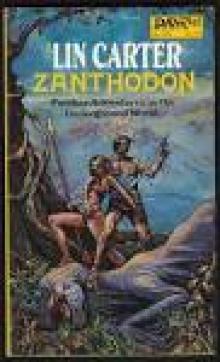 Zanthodon
Zanthodon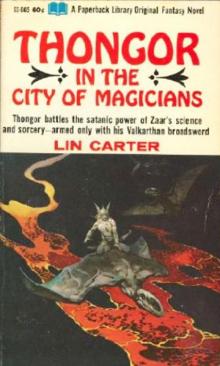 Thongor in the City of Magicians
Thongor in the City of Magicians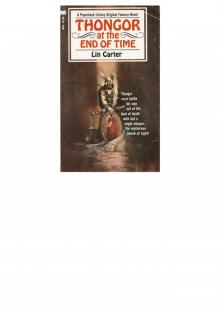 Thongor at the End of Time
Thongor at the End of Time The Valley Where Time Stood Still
The Valley Where Time Stood Still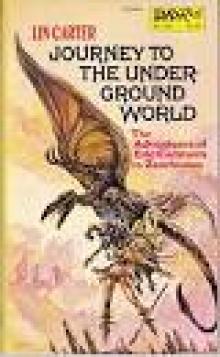 Journey To The Underground World
Journey To The Underground World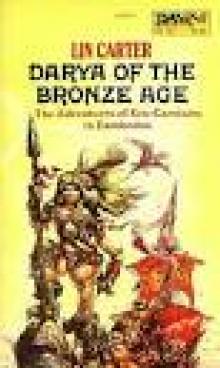 Darya of The Bronze Age
Darya of The Bronze Age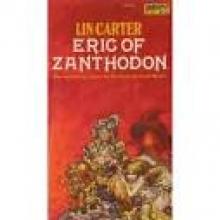 Eric of Zanthodon
Eric of Zanthodon Hurok Of The Stone Age
Hurok Of The Stone Age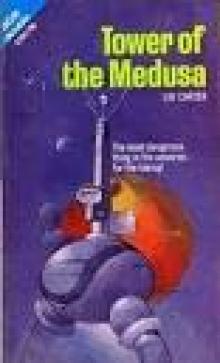 Tower Of The Medusa
Tower Of The Medusa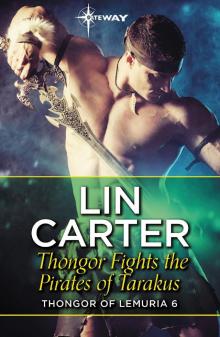 Thongor Fights the Pirates of Tarakus
Thongor Fights the Pirates of Tarakus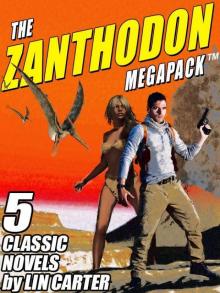 The Zanthodon MEGAPACK ™: The Complete 5-Book Series
The Zanthodon MEGAPACK ™: The Complete 5-Book Series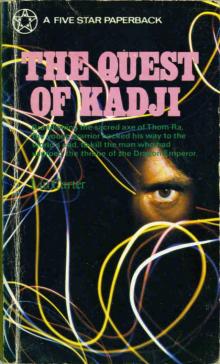 The Quest of Kadji
The Quest of Kadji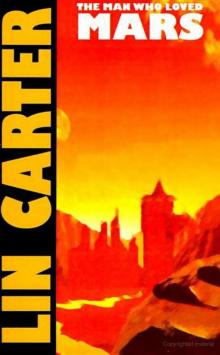 Lin Carter - The Man Who Loved Mars
Lin Carter - The Man Who Loved Mars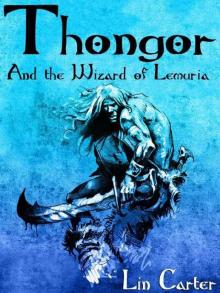 Thongor and the Wizard of Lemuria
Thongor and the Wizard of Lemuria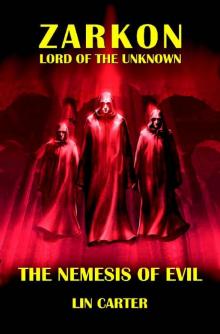 The Nemesis of Evil
The Nemesis of Evil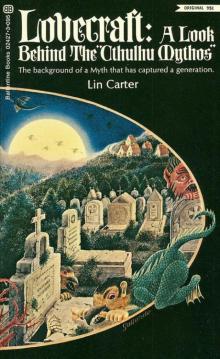 H.P.Lovecraft: A Look Behind Cthulhu Mythos
H.P.Lovecraft: A Look Behind Cthulhu Mythos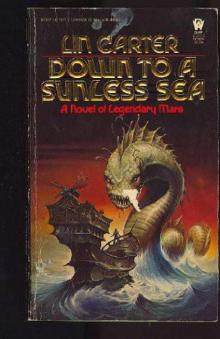 Lin Carter - Down to a Sunless Sea
Lin Carter - Down to a Sunless Sea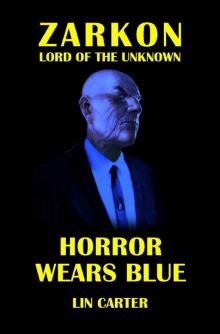 Horror Wears Blue
Horror Wears Blue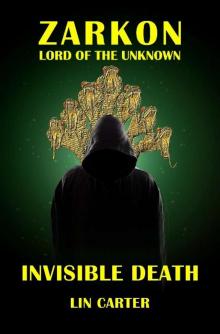 Invisible Death
Invisible Death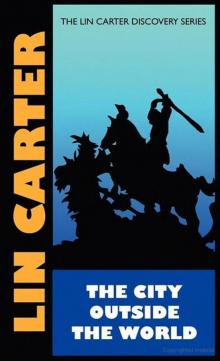 Lin Carter - The City Outside the World
Lin Carter - The City Outside the World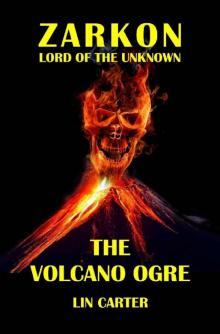 The Volcano Ogre
The Volcano Ogre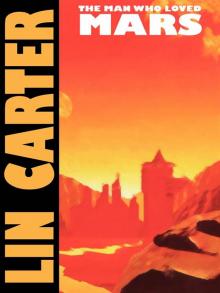 The Man Who Loved Mars
The Man Who Loved Mars